Book Review: The Road to Wigan Pier by George Orwell
VerifiedAdded on 2023/06/18
|9
|2971
|385
AI Summary
This report provides a review of the book 'The Road to Wigan Pier' by George Orwell, documenting his sociological investigations of the bleak living conditions among working-class people in Yorkshire and Lancashire before World War II. It includes an overview of the book, the author's background and perspective, methodology and methods used, themes and issues discussed, and the legacy of the book.
Contribute Materials
Your contribution can guide someone’s learning journey. Share your
documents today.

BOOK REVIEW
Secure Best Marks with AI Grader
Need help grading? Try our AI Grader for instant feedback on your assignments.
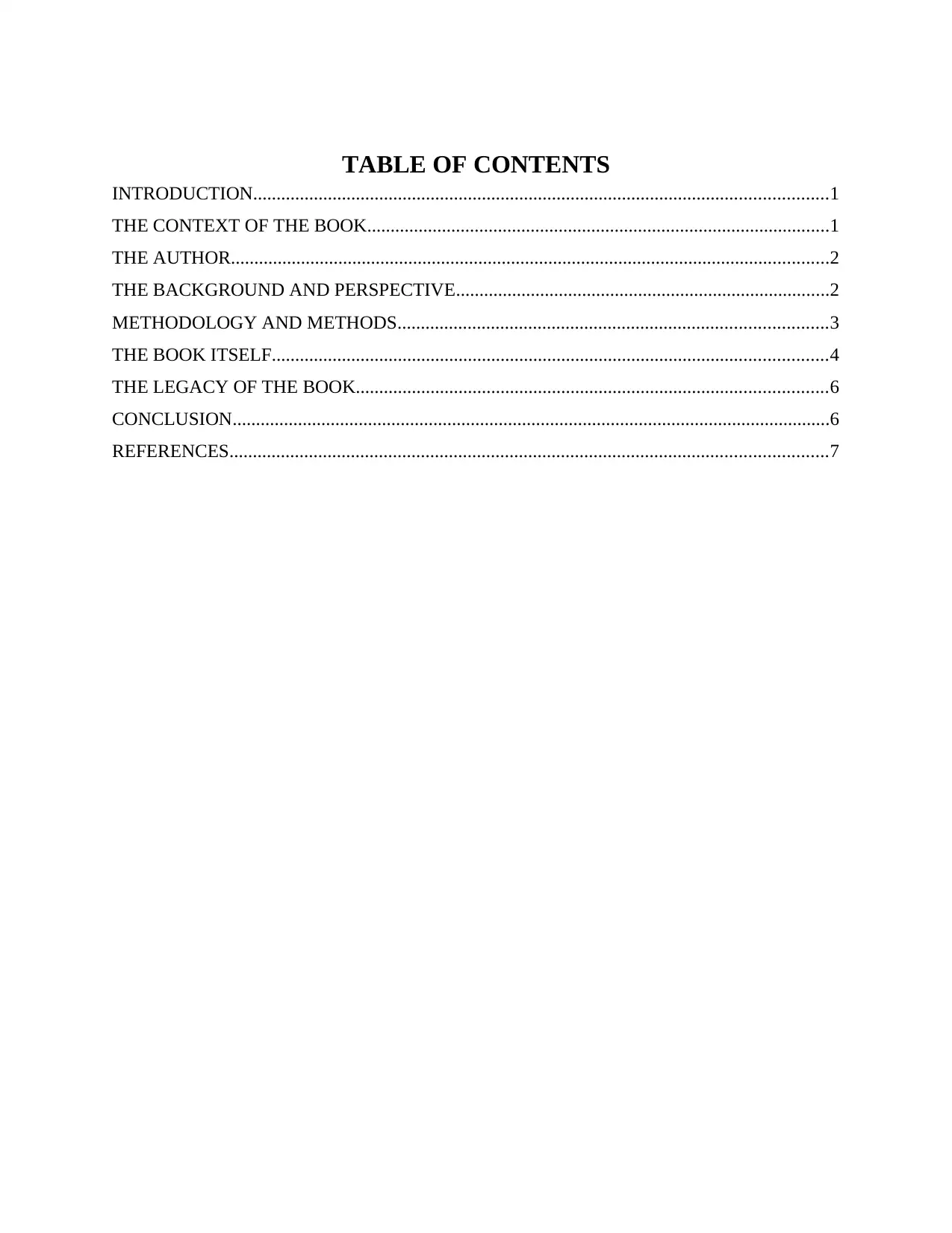
TABLE OF CONTENTS
INTRODUCTION...........................................................................................................................1
THE CONTEXT OF THE BOOK...................................................................................................1
THE AUTHOR................................................................................................................................2
THE BACKGROUND AND PERSPECTIVE................................................................................2
METHODOLOGY AND METHODS............................................................................................3
THE BOOK ITSELF.......................................................................................................................4
THE LEGACY OF THE BOOK.....................................................................................................6
CONCLUSION................................................................................................................................6
REFERENCES................................................................................................................................7
INTRODUCTION...........................................................................................................................1
THE CONTEXT OF THE BOOK...................................................................................................1
THE AUTHOR................................................................................................................................2
THE BACKGROUND AND PERSPECTIVE................................................................................2
METHODOLOGY AND METHODS............................................................................................3
THE BOOK ITSELF.......................................................................................................................4
THE LEGACY OF THE BOOK.....................................................................................................6
CONCLUSION................................................................................................................................6
REFERENCES................................................................................................................................7
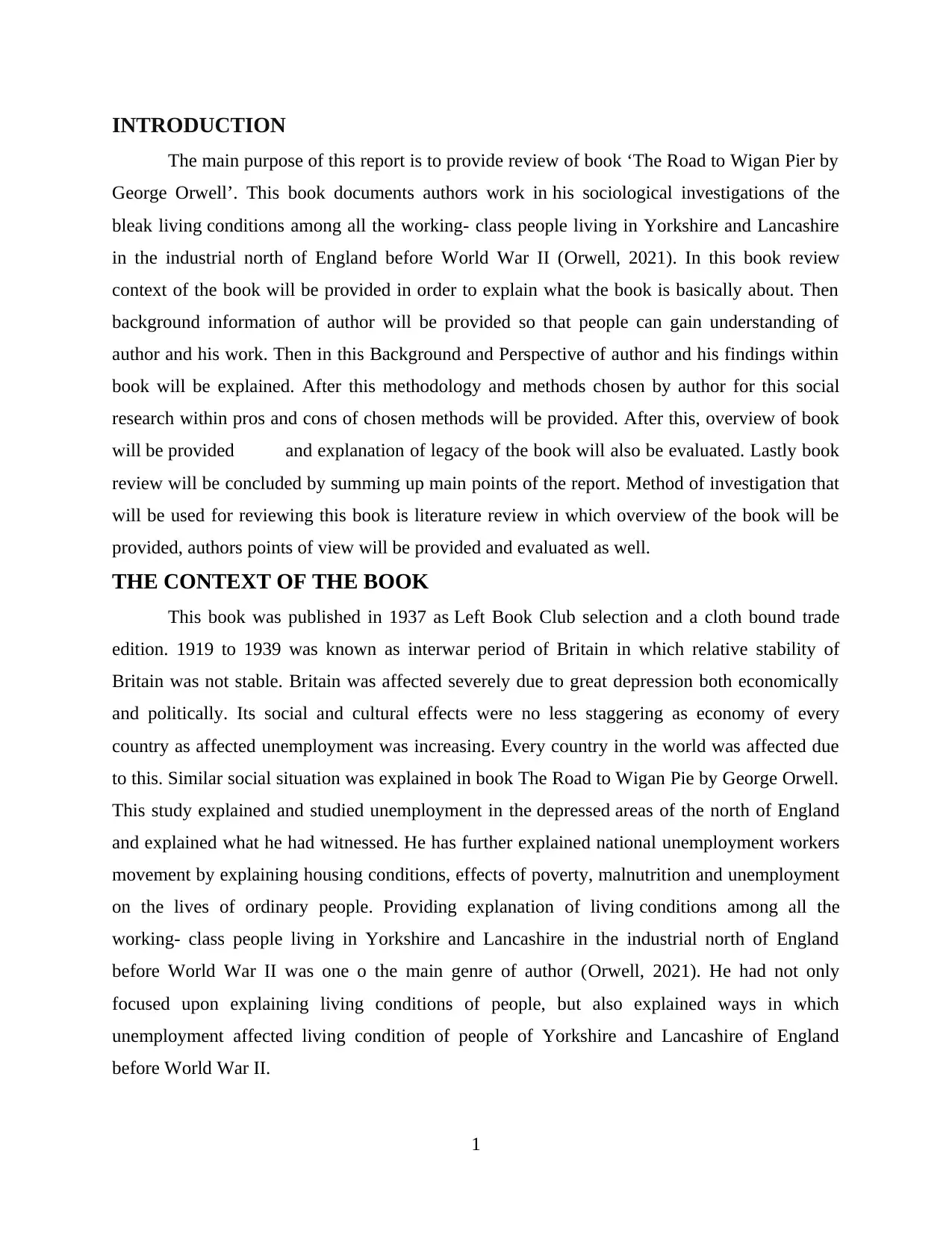
INTRODUCTION
The main purpose of this report is to provide review of book ‘The Road to Wigan Pier by
George Orwell’. This book documents authors work in his sociological investigations of the
bleak living conditions among all the working- class people living in Yorkshire and Lancashire
in the industrial north of England before World War II (Orwell, 2021). In this book review
context of the book will be provided in order to explain what the book is basically about. Then
background information of author will be provided so that people can gain understanding of
author and his work. Then in this Background and Perspective of author and his findings within
book will be explained. After this methodology and methods chosen by author for this social
research within pros and cons of chosen methods will be provided. After this, overview of book
will be provided and explanation of legacy of the book will also be evaluated. Lastly book
review will be concluded by summing up main points of the report. Method of investigation that
will be used for reviewing this book is literature review in which overview of the book will be
provided, authors points of view will be provided and evaluated as well.
THE CONTEXT OF THE BOOK
This book was published in 1937 as Left Book Club selection and a cloth bound trade
edition. 1919 to 1939 was known as interwar period of Britain in which relative stability of
Britain was not stable. Britain was affected severely due to great depression both economically
and politically. Its social and cultural effects were no less staggering as economy of every
country as affected unemployment was increasing. Every country in the world was affected due
to this. Similar social situation was explained in book The Road to Wigan Pie by George Orwell.
This study explained and studied unemployment in the depressed areas of the north of England
and explained what he had witnessed. He has further explained national unemployment workers
movement by explaining housing conditions, effects of poverty, malnutrition and unemployment
on the lives of ordinary people. Providing explanation of living conditions among all the
working- class people living in Yorkshire and Lancashire in the industrial north of England
before World War II was one o the main genre of author (Orwell, 2021). He had not only
focused upon explaining living conditions of people, but also explained ways in which
unemployment affected living condition of people of Yorkshire and Lancashire of England
before World War II.
1
The main purpose of this report is to provide review of book ‘The Road to Wigan Pier by
George Orwell’. This book documents authors work in his sociological investigations of the
bleak living conditions among all the working- class people living in Yorkshire and Lancashire
in the industrial north of England before World War II (Orwell, 2021). In this book review
context of the book will be provided in order to explain what the book is basically about. Then
background information of author will be provided so that people can gain understanding of
author and his work. Then in this Background and Perspective of author and his findings within
book will be explained. After this methodology and methods chosen by author for this social
research within pros and cons of chosen methods will be provided. After this, overview of book
will be provided and explanation of legacy of the book will also be evaluated. Lastly book
review will be concluded by summing up main points of the report. Method of investigation that
will be used for reviewing this book is literature review in which overview of the book will be
provided, authors points of view will be provided and evaluated as well.
THE CONTEXT OF THE BOOK
This book was published in 1937 as Left Book Club selection and a cloth bound trade
edition. 1919 to 1939 was known as interwar period of Britain in which relative stability of
Britain was not stable. Britain was affected severely due to great depression both economically
and politically. Its social and cultural effects were no less staggering as economy of every
country as affected unemployment was increasing. Every country in the world was affected due
to this. Similar social situation was explained in book The Road to Wigan Pie by George Orwell.
This study explained and studied unemployment in the depressed areas of the north of England
and explained what he had witnessed. He has further explained national unemployment workers
movement by explaining housing conditions, effects of poverty, malnutrition and unemployment
on the lives of ordinary people. Providing explanation of living conditions among all the
working- class people living in Yorkshire and Lancashire in the industrial north of England
before World War II was one o the main genre of author (Orwell, 2021). He had not only
focused upon explaining living conditions of people, but also explained ways in which
unemployment affected living condition of people of Yorkshire and Lancashire of England
before World War II.
1
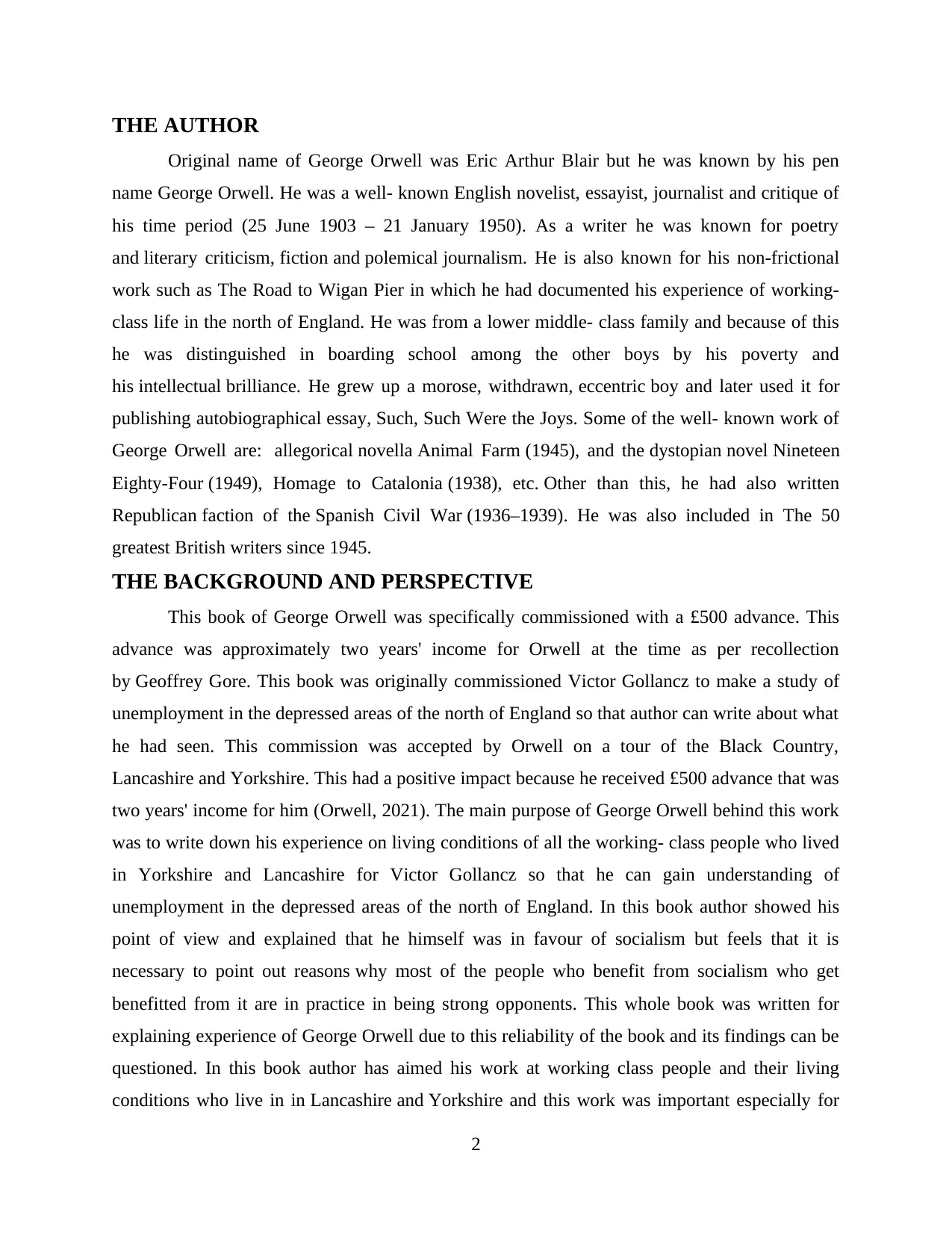
THE AUTHOR
Original name of George Orwell was Eric Arthur Blair but he was known by his pen
name George Orwell. He was a well- known English novelist, essayist, journalist and critique of
his time period (25 June 1903 – 21 January 1950). As a writer he was known for poetry
and literary criticism, fiction and polemical journalism. He is also known for his non-frictional
work such as The Road to Wigan Pier in which he had documented his experience of working-
class life in the north of England. He was from a lower middle- class family and because of this
he was distinguished in boarding school among the other boys by his poverty and
his intellectual brilliance. He grew up a morose, withdrawn, eccentric boy and later used it for
publishing autobiographical essay, Such, Such Were the Joys. Some of the well- known work of
George Orwell are: allegorical novella Animal Farm (1945), and the dystopian novel Nineteen
Eighty-Four (1949), Homage to Catalonia (1938), etc. Other than this, he had also written
Republican faction of the Spanish Civil War (1936–1939). He was also included in The 50
greatest British writers since 1945.
THE BACKGROUND AND PERSPECTIVE
This book of George Orwell was specifically commissioned with a £500 advance. This
advance was approximately two years' income for Orwell at the time as per recollection
by Geoffrey Gore. This book was originally commissioned Victor Gollancz to make a study of
unemployment in the depressed areas of the north of England so that author can write about what
he had seen. This commission was accepted by Orwell on a tour of the Black Country,
Lancashire and Yorkshire. This had a positive impact because he received £500 advance that was
two years' income for him (Orwell, 2021). The main purpose of George Orwell behind this work
was to write down his experience on living conditions of all the working- class people who lived
in Yorkshire and Lancashire for Victor Gollancz so that he can gain understanding of
unemployment in the depressed areas of the north of England. In this book author showed his
point of view and explained that he himself was in favour of socialism but feels that it is
necessary to point out reasons why most of the people who benefit from socialism who get
benefitted from it are in practice in being strong opponents. This whole book was written for
explaining experience of George Orwell due to this reliability of the book and its findings can be
questioned. In this book author has aimed his work at working class people and their living
conditions who live in in Lancashire and Yorkshire and this work was important especially for
2
Original name of George Orwell was Eric Arthur Blair but he was known by his pen
name George Orwell. He was a well- known English novelist, essayist, journalist and critique of
his time period (25 June 1903 – 21 January 1950). As a writer he was known for poetry
and literary criticism, fiction and polemical journalism. He is also known for his non-frictional
work such as The Road to Wigan Pier in which he had documented his experience of working-
class life in the north of England. He was from a lower middle- class family and because of this
he was distinguished in boarding school among the other boys by his poverty and
his intellectual brilliance. He grew up a morose, withdrawn, eccentric boy and later used it for
publishing autobiographical essay, Such, Such Were the Joys. Some of the well- known work of
George Orwell are: allegorical novella Animal Farm (1945), and the dystopian novel Nineteen
Eighty-Four (1949), Homage to Catalonia (1938), etc. Other than this, he had also written
Republican faction of the Spanish Civil War (1936–1939). He was also included in The 50
greatest British writers since 1945.
THE BACKGROUND AND PERSPECTIVE
This book of George Orwell was specifically commissioned with a £500 advance. This
advance was approximately two years' income for Orwell at the time as per recollection
by Geoffrey Gore. This book was originally commissioned Victor Gollancz to make a study of
unemployment in the depressed areas of the north of England so that author can write about what
he had seen. This commission was accepted by Orwell on a tour of the Black Country,
Lancashire and Yorkshire. This had a positive impact because he received £500 advance that was
two years' income for him (Orwell, 2021). The main purpose of George Orwell behind this work
was to write down his experience on living conditions of all the working- class people who lived
in Yorkshire and Lancashire for Victor Gollancz so that he can gain understanding of
unemployment in the depressed areas of the north of England. In this book author showed his
point of view and explained that he himself was in favour of socialism but feels that it is
necessary to point out reasons why most of the people who benefit from socialism who get
benefitted from it are in practice in being strong opponents. This whole book was written for
explaining experience of George Orwell due to this reliability of the book and its findings can be
questioned. In this book author has aimed his work at working class people and their living
conditions who live in in Lancashire and Yorkshire and this work was important especially for
2
Secure Best Marks with AI Grader
Need help grading? Try our AI Grader for instant feedback on your assignments.
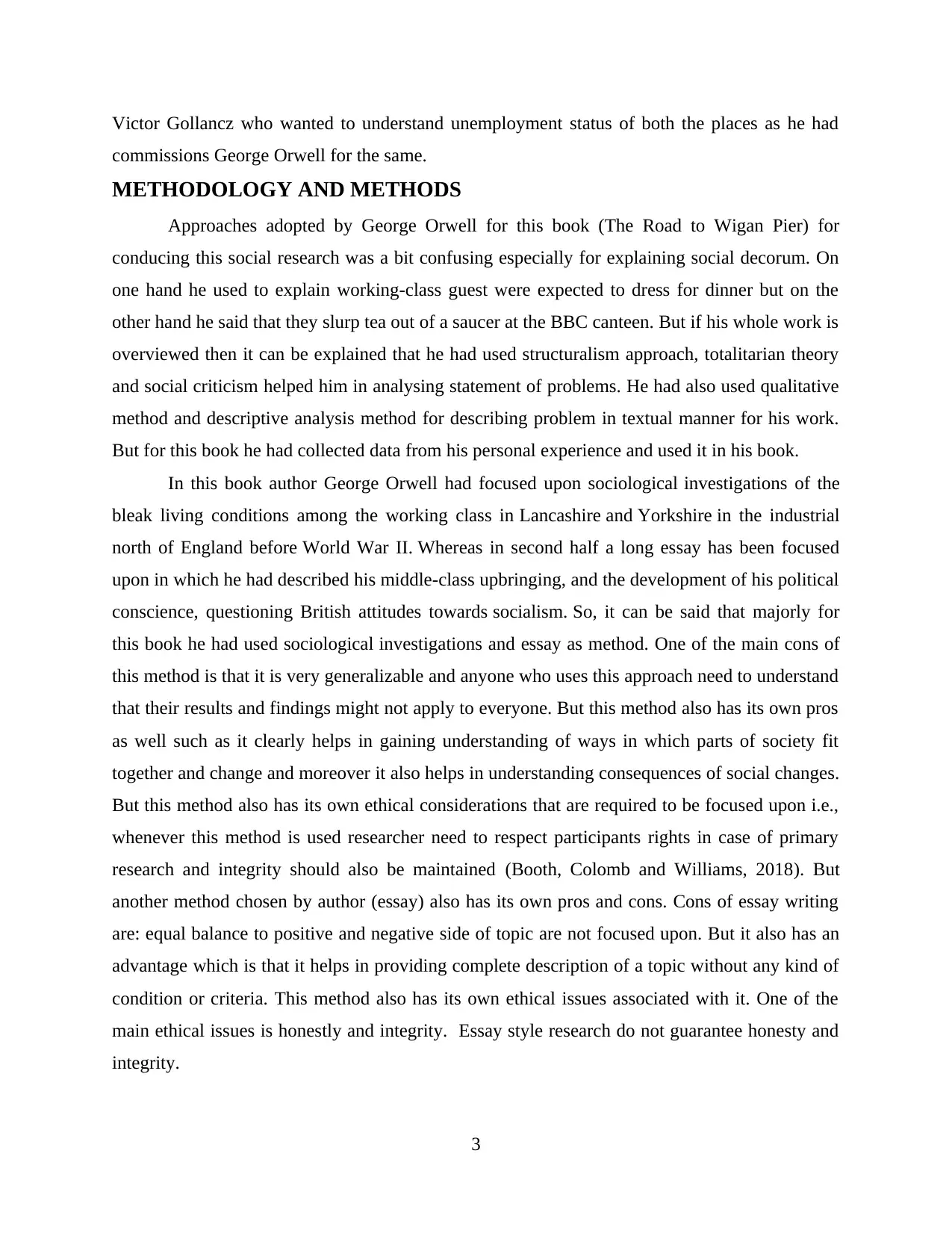
Victor Gollancz who wanted to understand unemployment status of both the places as he had
commissions George Orwell for the same.
METHODOLOGY AND METHODS
Approaches adopted by George Orwell for this book (The Road to Wigan Pier) for
conducing this social research was a bit confusing especially for explaining social decorum. On
one hand he used to explain working-class guest were expected to dress for dinner but on the
other hand he said that they slurp tea out of a saucer at the BBC canteen. But if his whole work is
overviewed then it can be explained that he had used structuralism approach, totalitarian theory
and social criticism helped him in analysing statement of problems. He had also used qualitative
method and descriptive analysis method for describing problem in textual manner for his work.
But for this book he had collected data from his personal experience and used it in his book.
In this book author George Orwell had focused upon sociological investigations of the
bleak living conditions among the working class in Lancashire and Yorkshire in the industrial
north of England before World War II. Whereas in second half a long essay has been focused
upon in which he had described his middle-class upbringing, and the development of his political
conscience, questioning British attitudes towards socialism. So, it can be said that majorly for
this book he had used sociological investigations and essay as method. One of the main cons of
this method is that it is very generalizable and anyone who uses this approach need to understand
that their results and findings might not apply to everyone. But this method also has its own pros
as well such as it clearly helps in gaining understanding of ways in which parts of society fit
together and change and moreover it also helps in understanding consequences of social changes.
But this method also has its own ethical considerations that are required to be focused upon i.e.,
whenever this method is used researcher need to respect participants rights in case of primary
research and integrity should also be maintained (Booth, Colomb and Williams, 2018). But
another method chosen by author (essay) also has its own pros and cons. Cons of essay writing
are: equal balance to positive and negative side of topic are not focused upon. But it also has an
advantage which is that it helps in providing complete description of a topic without any kind of
condition or criteria. This method also has its own ethical issues associated with it. One of the
main ethical issues is honestly and integrity. Essay style research do not guarantee honesty and
integrity.
3
commissions George Orwell for the same.
METHODOLOGY AND METHODS
Approaches adopted by George Orwell for this book (The Road to Wigan Pier) for
conducing this social research was a bit confusing especially for explaining social decorum. On
one hand he used to explain working-class guest were expected to dress for dinner but on the
other hand he said that they slurp tea out of a saucer at the BBC canteen. But if his whole work is
overviewed then it can be explained that he had used structuralism approach, totalitarian theory
and social criticism helped him in analysing statement of problems. He had also used qualitative
method and descriptive analysis method for describing problem in textual manner for his work.
But for this book he had collected data from his personal experience and used it in his book.
In this book author George Orwell had focused upon sociological investigations of the
bleak living conditions among the working class in Lancashire and Yorkshire in the industrial
north of England before World War II. Whereas in second half a long essay has been focused
upon in which he had described his middle-class upbringing, and the development of his political
conscience, questioning British attitudes towards socialism. So, it can be said that majorly for
this book he had used sociological investigations and essay as method. One of the main cons of
this method is that it is very generalizable and anyone who uses this approach need to understand
that their results and findings might not apply to everyone. But this method also has its own pros
as well such as it clearly helps in gaining understanding of ways in which parts of society fit
together and change and moreover it also helps in understanding consequences of social changes.
But this method also has its own ethical considerations that are required to be focused upon i.e.,
whenever this method is used researcher need to respect participants rights in case of primary
research and integrity should also be maintained (Booth, Colomb and Williams, 2018). But
another method chosen by author (essay) also has its own pros and cons. Cons of essay writing
are: equal balance to positive and negative side of topic are not focused upon. But it also has an
advantage which is that it helps in providing complete description of a topic without any kind of
condition or criteria. This method also has its own ethical issues associated with it. One of the
main ethical issues is honestly and integrity. Essay style research do not guarantee honesty and
integrity.
3
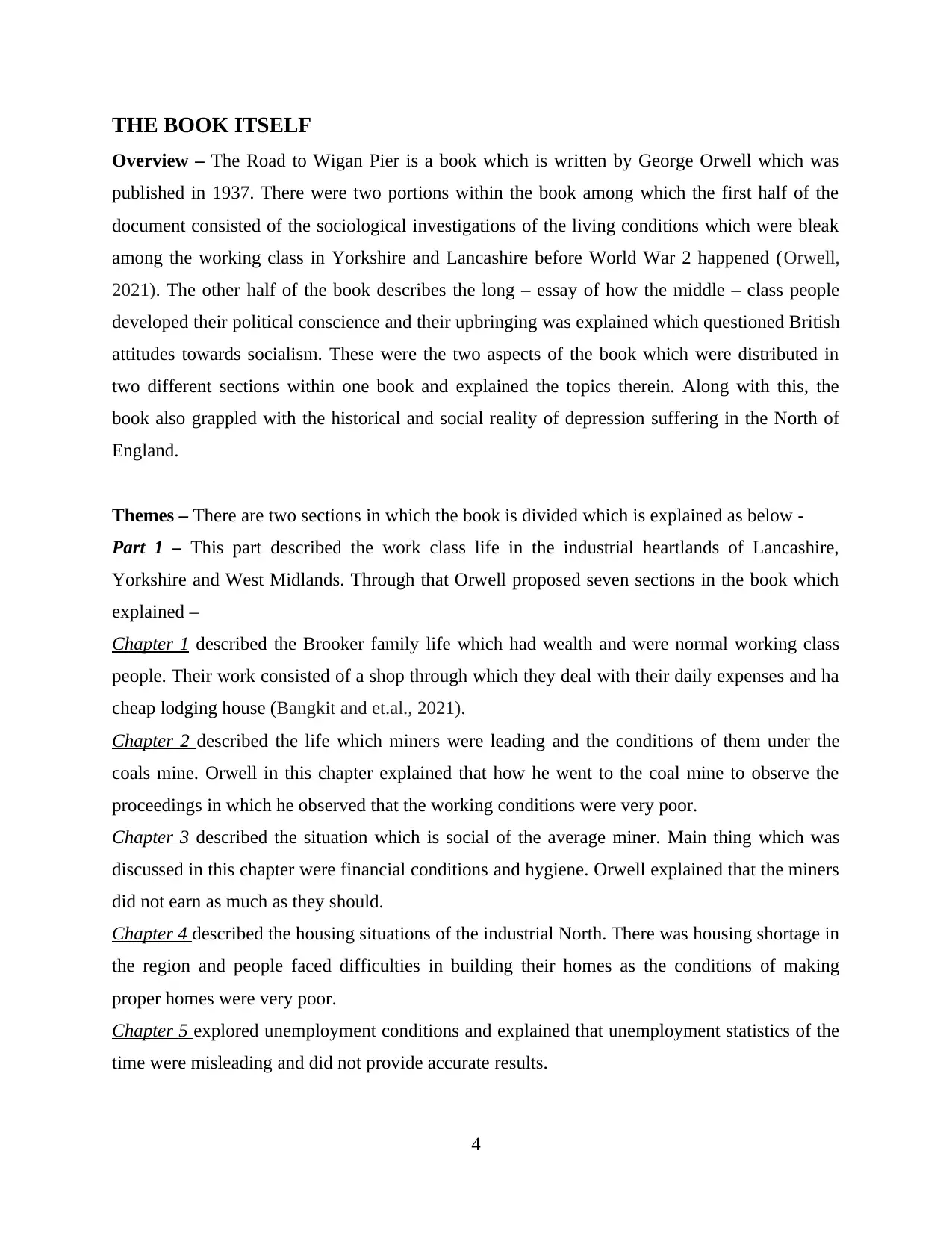
THE BOOK ITSELF
Overview – The Road to Wigan Pier is a book which is written by George Orwell which was
published in 1937. There were two portions within the book among which the first half of the
document consisted of the sociological investigations of the living conditions which were bleak
among the working class in Yorkshire and Lancashire before World War 2 happened (Orwell,
2021). The other half of the book describes the long – essay of how the middle – class people
developed their political conscience and their upbringing was explained which questioned British
attitudes towards socialism. These were the two aspects of the book which were distributed in
two different sections within one book and explained the topics therein. Along with this, the
book also grappled with the historical and social reality of depression suffering in the North of
England.
Themes – There are two sections in which the book is divided which is explained as below -
Part 1 – This part described the work class life in the industrial heartlands of Lancashire,
Yorkshire and West Midlands. Through that Orwell proposed seven sections in the book which
explained –
Chapter 1 described the Brooker family life which had wealth and were normal working class
people. Their work consisted of a shop through which they deal with their daily expenses and ha
cheap lodging house (Bangkit and et.al., 2021).
Chapter 2 described the life which miners were leading and the conditions of them under the
coals mine. Orwell in this chapter explained that how he went to the coal mine to observe the
proceedings in which he observed that the working conditions were very poor.
Chapter 3 described the situation which is social of the average miner. Main thing which was
discussed in this chapter were financial conditions and hygiene. Orwell explained that the miners
did not earn as much as they should.
Chapter 4 described the housing situations of the industrial North. There was housing shortage in
the region and people faced difficulties in building their homes as the conditions of making
proper homes were very poor.
Chapter 5 explored unemployment conditions and explained that unemployment statistics of the
time were misleading and did not provide accurate results.
4
Overview – The Road to Wigan Pier is a book which is written by George Orwell which was
published in 1937. There were two portions within the book among which the first half of the
document consisted of the sociological investigations of the living conditions which were bleak
among the working class in Yorkshire and Lancashire before World War 2 happened (Orwell,
2021). The other half of the book describes the long – essay of how the middle – class people
developed their political conscience and their upbringing was explained which questioned British
attitudes towards socialism. These were the two aspects of the book which were distributed in
two different sections within one book and explained the topics therein. Along with this, the
book also grappled with the historical and social reality of depression suffering in the North of
England.
Themes – There are two sections in which the book is divided which is explained as below -
Part 1 – This part described the work class life in the industrial heartlands of Lancashire,
Yorkshire and West Midlands. Through that Orwell proposed seven sections in the book which
explained –
Chapter 1 described the Brooker family life which had wealth and were normal working class
people. Their work consisted of a shop through which they deal with their daily expenses and ha
cheap lodging house (Bangkit and et.al., 2021).
Chapter 2 described the life which miners were leading and the conditions of them under the
coals mine. Orwell in this chapter explained that how he went to the coal mine to observe the
proceedings in which he observed that the working conditions were very poor.
Chapter 3 described the situation which is social of the average miner. Main thing which was
discussed in this chapter were financial conditions and hygiene. Orwell explained that the miners
did not earn as much as they should.
Chapter 4 described the housing situations of the industrial North. There was housing shortage in
the region and people faced difficulties in building their homes as the conditions of making
proper homes were very poor.
Chapter 5 explored unemployment conditions and explained that unemployment statistics of the
time were misleading and did not provide accurate results.
4
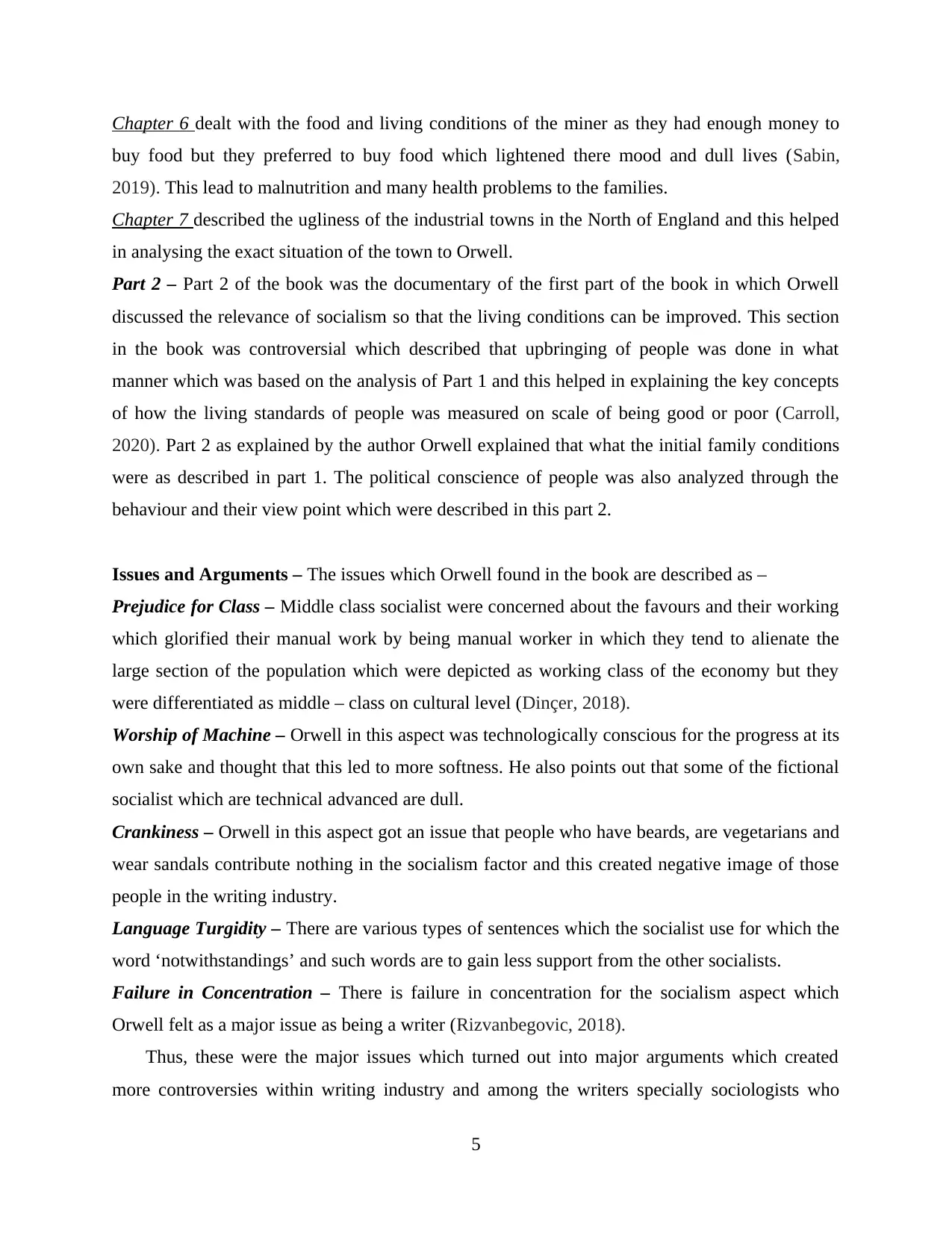
Chapter 6 dealt with the food and living conditions of the miner as they had enough money to
buy food but they preferred to buy food which lightened there mood and dull lives (Sabin,
2019). This lead to malnutrition and many health problems to the families.
Chapter 7 described the ugliness of the industrial towns in the North of England and this helped
in analysing the exact situation of the town to Orwell.
Part 2 – Part 2 of the book was the documentary of the first part of the book in which Orwell
discussed the relevance of socialism so that the living conditions can be improved. This section
in the book was controversial which described that upbringing of people was done in what
manner which was based on the analysis of Part 1 and this helped in explaining the key concepts
of how the living standards of people was measured on scale of being good or poor (Carroll,
2020). Part 2 as explained by the author Orwell explained that what the initial family conditions
were as described in part 1. The political conscience of people was also analyzed through the
behaviour and their view point which were described in this part 2.
Issues and Arguments – The issues which Orwell found in the book are described as –
Prejudice for Class – Middle class socialist were concerned about the favours and their working
which glorified their manual work by being manual worker in which they tend to alienate the
large section of the population which were depicted as working class of the economy but they
were differentiated as middle – class on cultural level (Dinçer, 2018).
Worship of Machine – Orwell in this aspect was technologically conscious for the progress at its
own sake and thought that this led to more softness. He also points out that some of the fictional
socialist which are technical advanced are dull.
Crankiness – Orwell in this aspect got an issue that people who have beards, are vegetarians and
wear sandals contribute nothing in the socialism factor and this created negative image of those
people in the writing industry.
Language Turgidity – There are various types of sentences which the socialist use for which the
word ‘notwithstandings’ and such words are to gain less support from the other socialists.
Failure in Concentration – There is failure in concentration for the socialism aspect which
Orwell felt as a major issue as being a writer (Rizvanbegovic, 2018).
Thus, these were the major issues which turned out into major arguments which created
more controversies within writing industry and among the writers specially sociologists who
5
buy food but they preferred to buy food which lightened there mood and dull lives (Sabin,
2019). This lead to malnutrition and many health problems to the families.
Chapter 7 described the ugliness of the industrial towns in the North of England and this helped
in analysing the exact situation of the town to Orwell.
Part 2 – Part 2 of the book was the documentary of the first part of the book in which Orwell
discussed the relevance of socialism so that the living conditions can be improved. This section
in the book was controversial which described that upbringing of people was done in what
manner which was based on the analysis of Part 1 and this helped in explaining the key concepts
of how the living standards of people was measured on scale of being good or poor (Carroll,
2020). Part 2 as explained by the author Orwell explained that what the initial family conditions
were as described in part 1. The political conscience of people was also analyzed through the
behaviour and their view point which were described in this part 2.
Issues and Arguments – The issues which Orwell found in the book are described as –
Prejudice for Class – Middle class socialist were concerned about the favours and their working
which glorified their manual work by being manual worker in which they tend to alienate the
large section of the population which were depicted as working class of the economy but they
were differentiated as middle – class on cultural level (Dinçer, 2018).
Worship of Machine – Orwell in this aspect was technologically conscious for the progress at its
own sake and thought that this led to more softness. He also points out that some of the fictional
socialist which are technical advanced are dull.
Crankiness – Orwell in this aspect got an issue that people who have beards, are vegetarians and
wear sandals contribute nothing in the socialism factor and this created negative image of those
people in the writing industry.
Language Turgidity – There are various types of sentences which the socialist use for which the
word ‘notwithstandings’ and such words are to gain less support from the other socialists.
Failure in Concentration – There is failure in concentration for the socialism aspect which
Orwell felt as a major issue as being a writer (Rizvanbegovic, 2018).
Thus, these were the major issues which turned out into major arguments which created
more controversies within writing industry and among the writers specially sociologists who
5
Paraphrase This Document
Need a fresh take? Get an instant paraphrase of this document with our AI Paraphraser
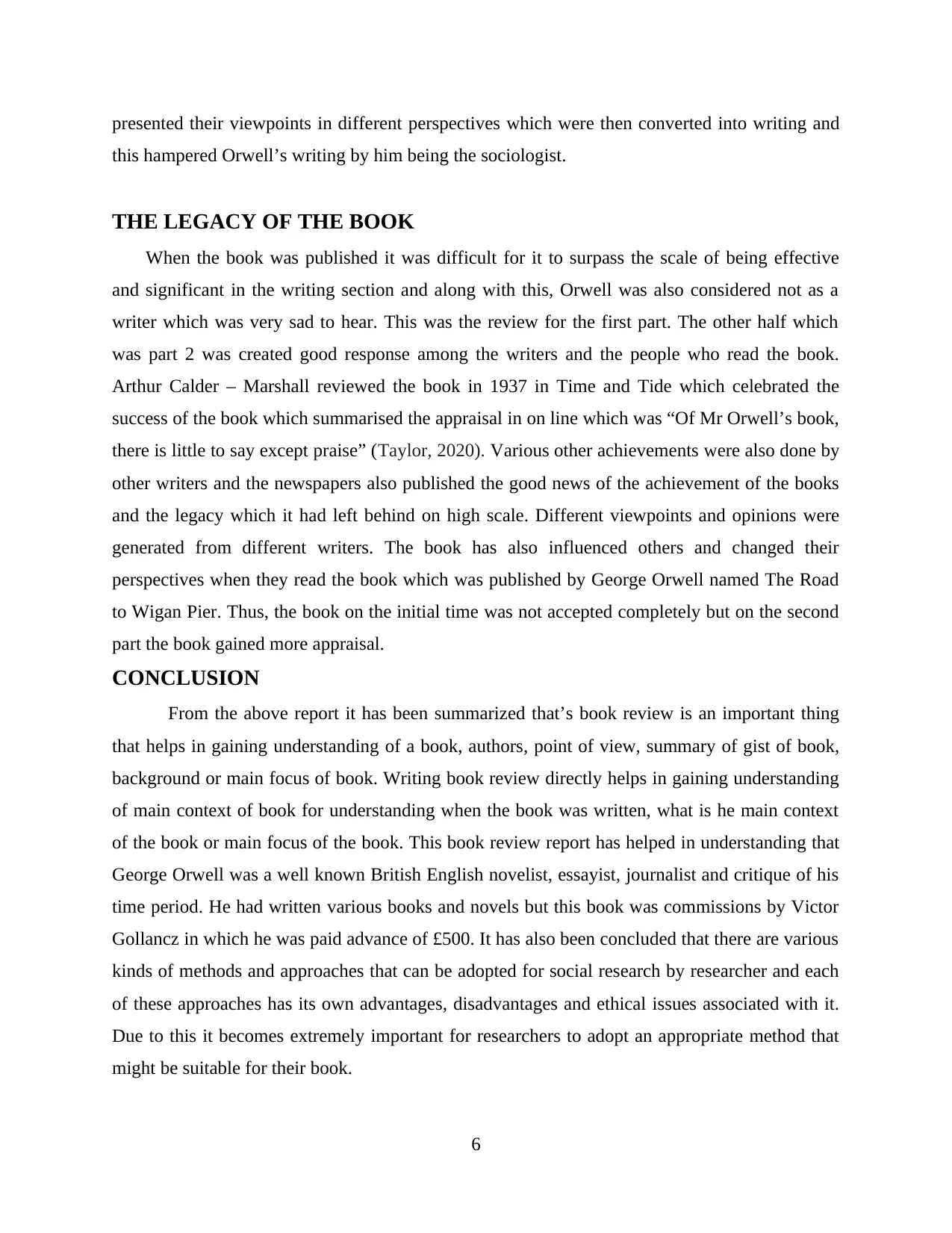
presented their viewpoints in different perspectives which were then converted into writing and
this hampered Orwell’s writing by him being the sociologist.
THE LEGACY OF THE BOOK
When the book was published it was difficult for it to surpass the scale of being effective
and significant in the writing section and along with this, Orwell was also considered not as a
writer which was very sad to hear. This was the review for the first part. The other half which
was part 2 was created good response among the writers and the people who read the book.
Arthur Calder – Marshall reviewed the book in 1937 in Time and Tide which celebrated the
success of the book which summarised the appraisal in on line which was “Of Mr Orwell’s book,
there is little to say except praise” (Taylor, 2020). Various other achievements were also done by
other writers and the newspapers also published the good news of the achievement of the books
and the legacy which it had left behind on high scale. Different viewpoints and opinions were
generated from different writers. The book has also influenced others and changed their
perspectives when they read the book which was published by George Orwell named The Road
to Wigan Pier. Thus, the book on the initial time was not accepted completely but on the second
part the book gained more appraisal.
CONCLUSION
From the above report it has been summarized that’s book review is an important thing
that helps in gaining understanding of a book, authors, point of view, summary of gist of book,
background or main focus of book. Writing book review directly helps in gaining understanding
of main context of book for understanding when the book was written, what is he main context
of the book or main focus of the book. This book review report has helped in understanding that
George Orwell was a well known British English novelist, essayist, journalist and critique of his
time period. He had written various books and novels but this book was commissions by Victor
Gollancz in which he was paid advance of £500. It has also been concluded that there are various
kinds of methods and approaches that can be adopted for social research by researcher and each
of these approaches has its own advantages, disadvantages and ethical issues associated with it.
Due to this it becomes extremely important for researchers to adopt an appropriate method that
might be suitable for their book.
6
this hampered Orwell’s writing by him being the sociologist.
THE LEGACY OF THE BOOK
When the book was published it was difficult for it to surpass the scale of being effective
and significant in the writing section and along with this, Orwell was also considered not as a
writer which was very sad to hear. This was the review for the first part. The other half which
was part 2 was created good response among the writers and the people who read the book.
Arthur Calder – Marshall reviewed the book in 1937 in Time and Tide which celebrated the
success of the book which summarised the appraisal in on line which was “Of Mr Orwell’s book,
there is little to say except praise” (Taylor, 2020). Various other achievements were also done by
other writers and the newspapers also published the good news of the achievement of the books
and the legacy which it had left behind on high scale. Different viewpoints and opinions were
generated from different writers. The book has also influenced others and changed their
perspectives when they read the book which was published by George Orwell named The Road
to Wigan Pier. Thus, the book on the initial time was not accepted completely but on the second
part the book gained more appraisal.
CONCLUSION
From the above report it has been summarized that’s book review is an important thing
that helps in gaining understanding of a book, authors, point of view, summary of gist of book,
background or main focus of book. Writing book review directly helps in gaining understanding
of main context of book for understanding when the book was written, what is he main context
of the book or main focus of the book. This book review report has helped in understanding that
George Orwell was a well known British English novelist, essayist, journalist and critique of his
time period. He had written various books and novels but this book was commissions by Victor
Gollancz in which he was paid advance of £500. It has also been concluded that there are various
kinds of methods and approaches that can be adopted for social research by researcher and each
of these approaches has its own advantages, disadvantages and ethical issues associated with it.
Due to this it becomes extremely important for researchers to adopt an appropriate method that
might be suitable for their book.
6
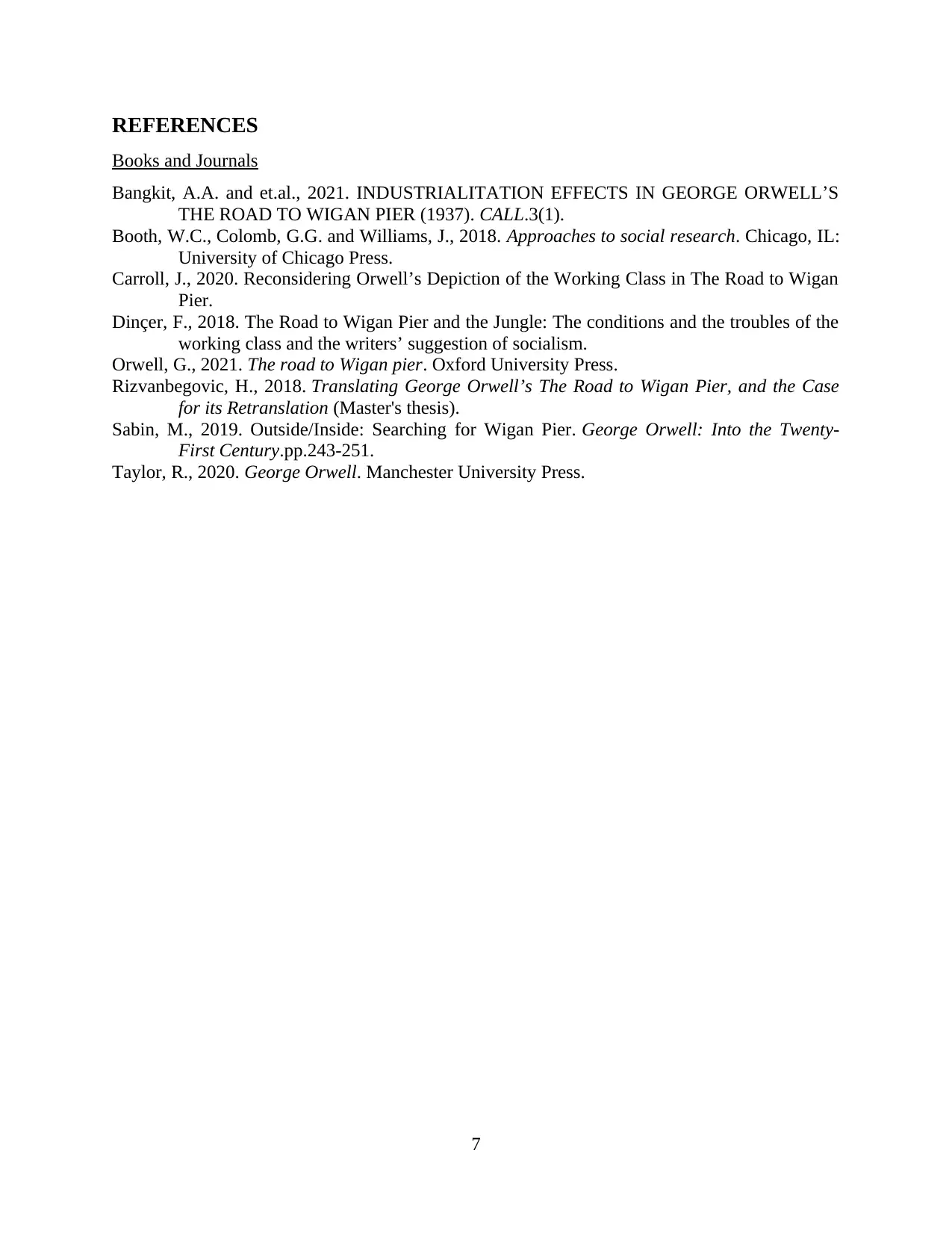
REFERENCES
Books and Journals
Bangkit, A.A. and et.al., 2021. INDUSTRIALITATION EFFECTS IN GEORGE ORWELL’S
THE ROAD TO WIGAN PIER (1937). CALL.3(1).
Booth, W.C., Colomb, G.G. and Williams, J., 2018. Approaches to social research. Chicago, IL:
University of Chicago Press.
Carroll, J., 2020. Reconsidering Orwell’s Depiction of the Working Class in The Road to Wigan
Pier.
Dinçer, F., 2018. The Road to Wigan Pier and the Jungle: The conditions and the troubles of the
working class and the writers’ suggestion of socialism.
Orwell, G., 2021. The road to Wigan pier. Oxford University Press.
Rizvanbegovic, H., 2018. Translating George Orwell’s The Road to Wigan Pier, and the Case
for its Retranslation (Master's thesis).
Sabin, M., 2019. Outside/Inside: Searching for Wigan Pier. George Orwell: Into the Twenty-
First Century.pp.243-251.
Taylor, R., 2020. George Orwell. Manchester University Press.
7
Books and Journals
Bangkit, A.A. and et.al., 2021. INDUSTRIALITATION EFFECTS IN GEORGE ORWELL’S
THE ROAD TO WIGAN PIER (1937). CALL.3(1).
Booth, W.C., Colomb, G.G. and Williams, J., 2018. Approaches to social research. Chicago, IL:
University of Chicago Press.
Carroll, J., 2020. Reconsidering Orwell’s Depiction of the Working Class in The Road to Wigan
Pier.
Dinçer, F., 2018. The Road to Wigan Pier and the Jungle: The conditions and the troubles of the
working class and the writers’ suggestion of socialism.
Orwell, G., 2021. The road to Wigan pier. Oxford University Press.
Rizvanbegovic, H., 2018. Translating George Orwell’s The Road to Wigan Pier, and the Case
for its Retranslation (Master's thesis).
Sabin, M., 2019. Outside/Inside: Searching for Wigan Pier. George Orwell: Into the Twenty-
First Century.pp.243-251.
Taylor, R., 2020. George Orwell. Manchester University Press.
7
1 out of 9
Related Documents
Your All-in-One AI-Powered Toolkit for Academic Success.
+13062052269
info@desklib.com
Available 24*7 on WhatsApp / Email
![[object Object]](/_next/static/media/star-bottom.7253800d.svg)
Unlock your academic potential
© 2024 | Zucol Services PVT LTD | All rights reserved.




